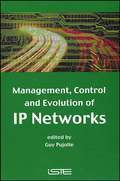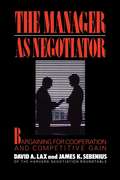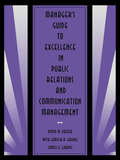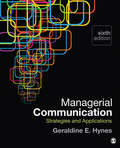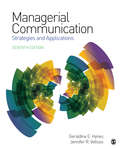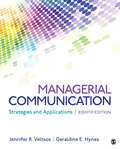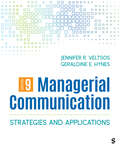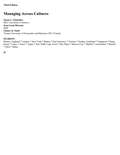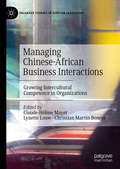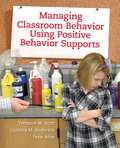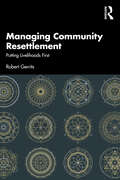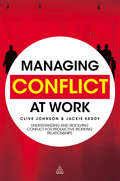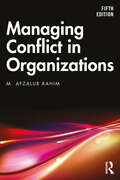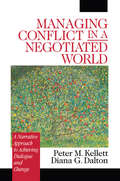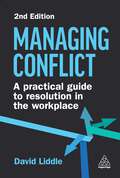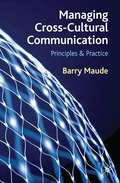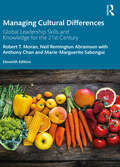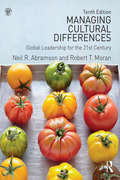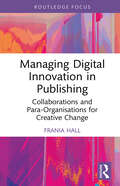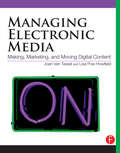- Table View
- List View
Management, Control and Evolution of IP Networks (Wiley-iste Ser.)
by Guy PujolleInternet Protocol (IP) networks have, for a number of years, provided the basis for modern communication channels. However, the control and management of these networks needs to be extended so that the required Quality of Service can be achieved. Information about new generations of IP networks is given, covering the future of pervasive networks (that is, networks that arealways present), Wi-Fi, the control of mobility and improved Quality of Service, sensor networks, inter-vehicle communication and optical networks.
Manager as Negotiator
by David A. LaxThis fine blend of Harvard scholarship and seasoned judgment is really two books in one. The first develops a sophisticated approach to negotiation for executives, attorneys, diplomats -- indeed, for anyone who bargains or studies its challenges. The second offers a new and compelling vision of the successful manager: as a strong, often subtle negotiator, constantly shaping agreements and informal understandings throughout the complex web of relationships in an organization.ons conflict. In such situations, The Manager as Negotiator shows how to creatively further the totality of one's interests, including important relationships -- in a way that Richard Walton, Harvard Business School Professor of Organizational Behavior, describes as "sensitive to the nuances of negotiating in organizations" and "relentless and skillful in making systematic sense of the process." This book differs fundamentally from the recent spate of negotiation handbooks that tend to espouse one of two approaches: the competitive ("Get yours and most of theirs, too") or the cooperative ("Everyone can always win"). Transcending such cynical and naive views, the authors develop a comprehensive approach, based on strategies and tactics for productively managing the tension between the cooperation and competition that are both inherent in bargaining. Based on the authors' extensive experience with hundreds of cases, and peppered with a number of wide-ranging examples, The Manager as Negotiator will be invaluable to novice and experienced negotiators, public and private managers, academics, and anyone who needs to know the state of the art in this important field.
Manager's Guide to Excellence in Public Relations and Communication Management (Routledge Communication Series)
by James E. Grunig Larissa A. Grunig David M. DozierThis book reports findings of a three-nation study of public relations and communication management sponsored by the International Association of Business Communicators (IABC) Research Foundation. The Excellence Study provides communication managers and public relations practitioners with information critical to their own professional growth, and supplies organizations with tools that help them communicate more effectively and build beneficial relations with key publics. Communication excellence is a powerful idea of sweeping scope that applies to all organizations -- large or small -- that need to communicate effectively with publics on whom the organization's survival and growth depend. The essential elements of excellent communication are the same for corporations, not-for-profit organizations, government agencies, and professional/trade associations. And they are applicable on a global basis. The study identifies three spheres of communication excellence. These spheres consider the overall function and role of communication in organizations, and define the organization of this book. They are: * the core or inner sphere of communication excellence -- the knowledge base of the communication department, * the shared expectations of top communicators and senior managers about the function and role of communication, and * the organization's culture -- the larger context that either nurtures or impedes communication excellence. This text also examines communication excellence as demonstrated in specific programs developed for specific publics.
Managerial Communication: Strategies and Applications
by Geraldine E. HynesA Practical, Strategic Approach to Managerial Communication Managerial Communication: Strategies and Applications focuses on communication skills and strategies that managers need in today’s workplace. This book continues to be the market leader due to its strategic approach, solid research base, comprehensive coverage, balanced examination of oral and written communication, and focus on managerial, not entry-level, competencies. In the Sixth Edition, author Geraldine E. Hynes preserves the book’s key strengths while reflecting the realities of the contemporary workplace.
Managerial Communication: Strategies and Applications
by Geraldine E. HynesA Practical, Strategic Approach to Managerial Communication Managerial Communication: Strategies and Applications focuses on communication skills and strategies that managers need in today’s workplace. This book continues to be the market leader due to its strategic approach, solid research base, comprehensive coverage, balanced examination of oral and written communication, and focus on managerial, not entry-level, competencies. In the Sixth Edition, author Geraldine E. Hynes preserves the book’s key strengths while reflecting the realities of the contemporary workplace.
Managerial Communication: Strategies and Applications
by Geraldine E. Hynes Jennifer R. VeltsosA Practical, Strategic Approach to Managerial Communication Managerial Communication: Strategies and Applications focuses on communication skills and strategies that managers need to be successful in today’s workplace. Known for its holistic overview of communication, solid research base, and focus on managerial competencies, this text continues to be the market leader in the field. In the Seventh Edition, author Geraldine E. Hynes and new co-author Jennifer R. Veltsos preserve the book’s strategic perspective and include new updates to reflect the modern workplace. The new edition adds a chapter on visual communication that explains how to design documents, memorable presentations, and impactful graphics. New coverage of virtual teams, virtual presentations, and online communication help students avoid common pitfalls when using technology.
Managerial Communication: Strategies and Applications
by Geraldine E. Hynes Jennifer R. VeltsosA Practical, Strategic Approach to Managerial Communication Managerial Communication: Strategies and Applications focuses on communication skills and strategies that managers need to be successful in today’s workplace. Known for its holistic overview of communication, solid research base, and focus on managerial competencies, this text continues to be the market leader in the field. In the Seventh Edition, author Geraldine E. Hynes and new co-author Jennifer R. Veltsos preserve the book’s strategic perspective and include new updates to reflect the modern workplace. The new edition adds a chapter on visual communication that explains how to design documents, memorable presentations, and impactful graphics. New coverage of virtual teams, virtual presentations, and online communication help students avoid common pitfalls when using technology.
Managerial Communication: Strategies and Applications
by Geraldine E. Hynes Jennifer R. VeltsosThe market-leading Managerial Communication: Strategies and Applications equips students with the communication strategies and skills that managers need in today’s workplace. Authors Jennifer R. Veltsos and Geraldine E. Hynes provide a holistic overview of communication supported with a solid research base, and a focus on competencies that lead to managerial and organizational success. The Eighth Edition features new and expanded coverage of timely topics, including remote working, virtual presentations, cultural sensitivity, and crisis communication.
Managerial Communication: Strategies and Applications
by Geraldine E. Hynes Jennifer R. VeltsosThe market-leading Managerial Communication: Strategies and Applications equips students with the communication strategies and skills that managers need in today’s workplace. Authors Jennifer R. Veltsos and Geraldine E. Hynes provide a holistic overview of communication supported with a solid research base, and a focus on competencies that lead to managerial and organizational success. The Eighth Edition features new and expanded coverage of timely topics, including remote working, virtual presentations, cultural sensitivity, and crisis communication.
Managerial Communication: Strategies and Applications
by Geraldine E. Hynes Jennifer R. VeltsosManagerial Communication focuses on communication skills and strategies that managers need to be successful in today’s workplace. Known for its holistic overview of communication and focus on managerial competencies, it continues to be the market leader in the field. The Ninth Edition provides coverage of current topics like managing hybrid and virtual teams, ChatGPT and artificial intelligence, and empathic listening.
Managerial Communication: Strategies and Applications
by Geraldine E. Hynes Jennifer R. VeltsosManagerial Communication focuses on communication skills and strategies that managers need to be successful in today’s workplace. Known for its holistic overview of communication and focus on managerial competencies, it continues to be the market leader in the field. The Ninth Edition provides coverage of current topics like managing hybrid and virtual teams, ChatGPT and artificial intelligence, and empathic listening.
Managing Across Cultures
by Susan Schneider Jean-Louis Barsoux Günter StahlThis is a book about managing across cultures: the threats and opportunities, the problems and possibilities. Rather than experiencing cultural differences as threats to be overcome or as unfortunate remnants of history to be endured, we challenge the reader to experience and enjoy the richness of cultural differences. Rather than creating a cultural melting pot, we need to design organisations as cultural mosaics in which each element preserves its unique value.
Managing Chinese-African Business Interactions: Growing Intercultural Competence in Organizations (Palgrave Studies in African Leadership)
by Claude-Hélène Mayer Lynette Louw Christian Martin BonessThis book provides deep insights into intercultural collaboration among business partners, employees, managers, and entrepreneurs in Chinese-African professional interactions. It presents cultural and theoretical knowledge on Chinese and African management, leadership, and philosophy. Chinese and African scholars and professionals share their insights into how to address intercultural management challenges proactively and successfully. The cases provide insights into a wide variety of industries and offer actual scenarios studied in governmental, parastatal, and private Chinese-owned organizations in twelve African countries. This book will benefit a broad readership including scholars in employment relations and business management as well as African and Chinese collaborators in academia, government, NGOs and industry.
Managing Classroom Behavior Using Positive Behavior Supports
by Terrance M. Scott Cynthia M. Anderson Peter AlterAn essential how-to guide to positive behavior support in schools, this text focuses on practical strategies for the classroom with step-by-step application examples.
Managing Community Resettlement: Putting Livelihoods First
by Robert GerritsEach year millions of people are displaced from their homes and lands. While international environmental and social performance standards on land access and involuntary resettlement exist, no framework supporting livelihood restoration has been developed. This book provides a framework that will help improve practice for those who are involved in resettlement projects and, crucially, improve the outcomes for the resettlement-affected households and communities. Evidence from the implementation of public- and private-sector-led resettlement projects indicates that livelihood restoration is a persistent shortcoming, if not failure, across these projects. This book addresses this issue by re-characterising the ‘livelihood restoration’ objective as ‘livelihood re-establishment and development’ and proposes a framework for the entire resettlement process that puts livelihood considerations first. The framework enables proactive identification of the potential livelihood challenges associated with each step of the resettlement process (design, planning, execution, monitoring and evaluation), as well as the opportunities that resettlement, project development and induced economic growth create. This book is essential reading for experts in social impact assessment, resettlement specialists, planners, administrators, non-governmental and civil society organisations and students of development studies and social policy.
Managing Conflict at Work: Understanding and Resolving Conflict for Productive Working Relationships
by Clive Johnson Jackie KeddyManaging Conflict at Work provides practical guidance on how to prevent, contain and resolve conflict in the workplace. It demonstrates how effective conflict management can have a powerful impact on the way organisations channel their energies; encouraging positive mindsets and building stronger and happier workforces. Putting the cost of rising conflict in context with recessionary times, it looks beyond individual cases to issues such as workforce motivation and corporate responsibility. The authors provide a wide range of practical techniques, tools and templates to support individuals who need to facilitate the resolution of employee disputes. Aimed not just at mediators and conflict practitioners, but at staff managers and anyone who needs to deal with people disputes; the book emphasises simple and practical ways for dealing with conflict situations - both when potential disputes are first emerging, and once a conflict has escalated into a formal complaint.Also including international case studies, extensive appendix of templates, tools and forms, including stakeholder analysis, mediation in-take forms and reflective questioning prompts, Managing Conflict at Work provides practical support to ensure that your company prevents disputes and stays within the law. The book is accompanied by an extensive range of ready-to-use templates and case studies and is supported by a dedicated website, providing information and downloads referred to in the book, as well as videos and podcasts.
Managing Conflict in Organizations
by M. Afzalur RahimManaging Conflict in Organizations introduces the origins, forms, benefits, and consequences of organizational conflict to students and practitioners and teaches how best to manage conflict to achieve productive outcomes. Conflict has benefits: it may lead to solutions to problems, creativity, and innovation. In contrast, little or no conflict in organizations may lead to stagnation, poor decisions, and ineffectiveness. This book is a vigorous analysis of the rational application of conflict theory in organizations for organizational behavior students, as well as practitioners looking to practice constructive conflict management in their work. This fifth edition has been thoroughly updated to reflect the latest research in the field and explains the effect that research has on practice, with an expanded range of practical examples and cases. It covers emergent topics such as: • Differentials in conflict management styles across generations. • Technology and its effect on conflict style changes. • Cross-cultural studies and diversity. This text is a valuable resource for students, instructors, and researchers in human resource management and organizational behavior, and a practical handbook for practitioners that manage (or manage upward) their colleagues.
Managing Conflict in a Negotiated World: A Narrative Approach to Achieving Productive Dialogue and Change
by Dr Peter M. Kellett Diana G. DaltonKellett and Dalton present a core text in Conflict Management derived from extensive class testing of their material. Their book helps readers understand the elements of conflict and act on that understanding by managing conflict better in each area of their lives - work, family, and community.
Managing Conflict in a Negotiated World: A Narrative Approach to Achieving Productive Dialogue and Change
by Diana G. Dalton Dr. Peter M. KellettKellett and Dalton present a core text in Conflict Management derived from extensive class testing of their material. Their book helps readers understand the elements of conflict and act on that understanding by managing conflict better in each area of their lives - work, family, and community.
Managing Conflict: A Practical Guide to Resolution in the Workplace
by David LiddleWhether it's a disagreement between colleagues, a dispute with management or large-scale industrial action, conflict at work is a perennial problem for organizations, their people and profits.The second edition of Managing Conflict shows HR professionals how to tackle these problems by not only resolving current issues, but also preventing future instances of conflict. It includes the latest research and case studies showing how conflict management has been impacted by hybrid working models and digitalization. There are also updates to reflect how resolution is a driver of trust in organizations, enabling people to disagree more constructively in a safe environment.This book covers the causes and costs of conflict, the impact of the psychological contract and the legal framework for managing workplace disputes both in the UK and internationally. It shows how to design a conflict management strategy, develop a formal resolution process and engage stakeholders and training managers in resolution and mediation skills. Packed with best practice examples from organizations such as Tesco, Burberry and Nationwide Building Society as well as conflict resolution resources and toolkits, this book is essential reading for all HR professionals looking to resolve conflict in the workplace.
Managing Cross-cultural Communication: Principles And Practice
by Barry MaudeAn accessible and lively introduction to the management of cross-cultural communication for undergraduate and graduate business students. Drawing on the latest research and incorporating the author's own extensive experience of working in different cultural settings, it addresses the core theory and practice. An essential course companion.
Managing Cultural Differences: Global Leadership Skills and Knowledge for the 21st Century
by Robert T. Moran Neil Remington Abramson Anthony Chan Sabongui Marie-MargueriteIn today’s global business environment, it is vital that individuals and organizations have sophisticated global leadership skills. Communication and understanding of different cultures are paramount to business success. This new edition of the bestselling textbook Managing Cultural Differences guides students and practitioners to an understanding of how to do business internationally, providing practical advice on how competitive advantage can be gained through effective cross-cultural management. The digitization of the workplace, the integration of artificial intelligence into workplace cultures, cultural responses to crisis, and the value of diversity and inclusion are just a few examples of contemporary issues discussed in this text. This latest edition also begins with a completely new introductory chapter, which provides an overview and connects the themes between chapters for an integrated understanding of the topic. With a wealth of new examples, case studies, and online materials, this textbook is required course reading for undergraduates, postgraduates, and MBA students alike, as well as being a vital tool for anybody selling, purchasing, traveling, or working internationally.
Managing Cultural Differences: Global Leadership for the 21st Century (Managing Cultural Differences Ser.)
by Robert T. Moran Neil Remington AbramsonIn today’s global business environment, it is vital that individuals and organizations have sophisticated global leadership skills. Communication and understanding of different cultures is paramount to business success. This new edition of the bestselling textbook, Managing Cultural Differences, guides students and practitioners to an understanding of how to do business internationally, providing practical advice on how competitive advantage can be gained through effective cross-cultural management. Crises in the Middle East, the weakening of some emerging markets, and the value of diversity and inclusion are just a few examples of contemporary issues discussed in this text, which also introduces a completely new chapter on global business ethics. With a wealth of new examples, case studies, and online materials, this textbook is required course reading for undergraduates, postgraduates, and MBA students alike, as well as being a vital tool for anybody selling, purchasing, traveling, or working internationally.
Managing Digital Innovation in Publishing: Collaborations and Para-Organisations for Creative Change
by Frania HallReflecting proactively on a growing industry 'dilemma', this book explores how publishing businesses can and do successfully experiment and innovate in digital publishing through collaboration.Many sectors of publishing are still structured around print production, with digital innovation in the consumer arena generally focused on different book formats, such e-books and audiobooks, rather than on brand-new types of products. Publishers need to innovate around different sorts of content and digital formats as consumers change their media habits. However, their pricing, business and risk models, and workflows are reflective of a legacy of print publishing; and as print commands so much revenue, publishers do not want to derail their main business as they experiment. Drawing on an analysis of collaboration and network theory and four in-depth qualitative case studies in different sectors, this research suggests that collaboration, particularly engaging with the wider creative sector, is key to the sustainable development of new types of products. It points to the characteristics of a successful digital collaboration and explains how to manage publishing innovation alongside the existing business, through para-organisations. Considering novel approaches to innovation, such as iterative software-style approaches and agile project management, as well as new business models, such as those employed in games development, the author shows how introducing new people – from software developers to competitors – can help instill a collaborative mindset within the organisation and facilitate constructive experimentation.Managing Digital Innovation in Publishing will be of interest to upper-level students and researchers of (digital) publishing and related creative industries.
Managing Electronic Media: Making, Moving and Marketing Digital Content
by Joan Van TasselThis college-level media management textbook reflects the changes in the media industries that have occurred in the past decade. Today's managers must address new issues that their predecessors never faced, from the threats of professional piracy and casual copying of digital media products, to global networks, on-demand consumption, and changing business models. The book explains the new new vocabulary of media moguls, such as bandwidth, digital rights management, customer relations management, distributed work groups, centralized broadcast operations, automated playlists, server-based playout, repurposing, mobisodes, TV-to-DVD, and content management. The chapters logically unfold the ways that managers are evolving their practices to make content, market it, and deliver it to consumers in a competitive, global digital marketplace. In addition to media companies, this book covers management processes that extend to all content-producing organizations, because today's students are as likely to produce high-quality video and Web video for ABC Computer Sales as they are for the ABC Entertainment Television Network.
